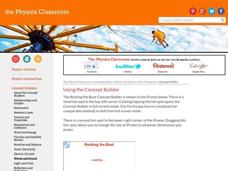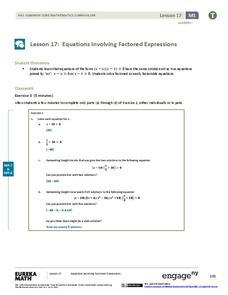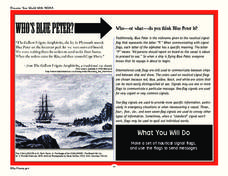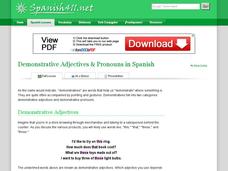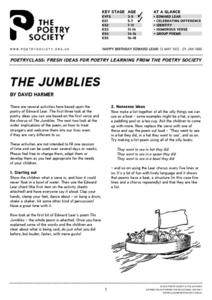Bowels Physics
Electrostatics
Explore behavior of particles that cannot be seen with a detailed PowerPoint presentation that outlines the basics of electrostatics. The presentation addresses the charge of subatomic particles, conductors and insulators,...
Physics Classroom
Rocking the Boat
Sometimes it's okay to rock the boat! Science scholars manipulate wave properties using a fun interactive. Part of a larger playlist that dives into waves and sound, the lesson helps users work their way from apprentice to wizard by...
Alabama Learning Exchange
Classifying Complex Numbers
Imaginary numbers are a real thing. Scholars learn about complex numbers, real numbers, and imaginary numbers. They classify given numbers as strictly complex, strictly real, or strictly imaginary in an individual or group activity.
Curated OER
The Imperfect (Past) Subjunctive: How?
Teach your class how to form the imperfect subjunctive. Included here is information on and examples of regular imperfect subjunctive verbs, irregular imperfect subjunctive verbs, and imperfect subjunctive -se endings displayed in long...
ReadWriteThink
Exploring Plagiarism, Copyright, and Paraphrasing
Plagiarism, copyright, and fair use are the focus of a three-part instructional activity designed to inform scholars of how to properly cite others' work. First, pupils use a KWL chart to begin thinking and...
Willow Tree
Percents
We see percents everywhere! Building a solid understanding of their meaning is important to future mathematics, but also as citizens. Young scholars practice rewriting decimals, percents, and fractions. They also determine percents of a...
EngageNY
Equations Involving Factored Expressions
Be ready mathematicians of every level. This instructional activity leads to the discovery of the zero product property and provides challenges for early finishers along the way. At conclusion, pupils understand the process of using the...
NOAA
Who’s Blue Peter?
Scholars discover who Blue Peter is and how sailors used nautical signal flags on the open waters in order to create their own set of nautical signal flags and send messages to peers.
Concord Consortium
Calculator Numbers
Know thy calculator. Young mathematicians use their calculators to answer a set of questions. They consider how the number of digits the calculator displays affects the answers to calculations. They then find examples of computations...
K12 Reader
Water Water Everywhere
The protection of our water supply is the subject of an article used in this cross-curricular reading comprehension worksheet. After studying the passage, readers use information from the text to respond to a series of comprehension...
K12 Reader
David Copperfield
High schoolers use the provided graphic organizer to demonstrate their ability to identify the main idea and supporting ideas in a passage from Charles Dickens' David Copperfield.
Illustrative Mathematics
Lines of Symmetry for Triangles
What can symmetry tell us about triangles? After looking at four examples, learners will come to realize that lines of symmetry are different for equilateral, isosceles, and scalene triangles. Use this guided practice activity as an...
Illustrative Mathematics
Comparing Numbers
Young mathematicians spin their way to a deeper number sense with this fun, collaborative activity. Using two spinners, one with the numbers 0-9 and the other with the decades 00-90, pairs of students take turns building and comparing...
K12 Reader
Edgar Allan Poe’s Mystery Valentine
Riddle me this! As part of a Valentine's celebration, class members are challenged to find the key to solve the riddle in Edgar Allan Poe's Valentine poem.
Channel Islands Film
Magic Isle: Lesson Plan 1
What are the factors that limit growth and expansion? As part of their study of Catalina Island, class members view the West of the West's documentary Magic Isle and research William Wrigley and the Santa Catalina Island Company. After...
Physics Classroom
Electric Field Intensity
Learning about electrostatics can be pretty intense! Physics fanatics explore the factors that affect electric field intensity using an interactive from the Static Electricity series. Learners work to complete data tables that relate...
Curated OER
Demonstrative Adjectives & Pronouns in Spanish
Encourage mastery of demonstrative adjectives and demonstrative pronouns. Try out the presentation to introduce your class to the concepts and practice with two integrated exercises. The At a Glance tab and Full Lesson tab can be used...
Curated OER
The Present Subjunctive: How?
Once your class has mastered the indicative, it's time to present the subjunctive mood. This resource focuses solely on how to conjugate in the present subjunctive, but does link to more information on how to to use it. Class members can...
Blake Education
Drama Warm Ups
Here's a 15-page packet packed with ideas for warm-up activities that can be used for drama classes or in content courses. Each activity is coded to indicate materials needed, space requirements and appropriate audience. A great...
Poetry Society
The Jumblies
Who would ever think to go to sea in a sieve? Only Edward Lear's Jumblies! The poem "The Jumblies" is the inspiration for these poetry reading and writing activities that ask learners to think about how strangers are different, consider...
BW Walch
Creating and Graphing Exponential Equations
Frequently found in biology and economic application problems, exponential equations show up as stars in this introductory presentation. Taking no background or knowledge of exponentials for granted, the slides walk learners...
EngageNY
Summarizing Bivariate Categorical Data
How do you summarize data that cannot be averaged? Using an exploratory method, learners complete a two-way frequency table on super powers. The subject matter builds upon 8th grade knowledge of two-way tables.
Inside Mathematics
Quadratic (2006)
Most problems can be solved using more than one method. A worksheet includes just nine questions but many more ways to solve each. Scholars must graph, solve, and justify quadratic problems.
EngageNY
Congruence Criteria for Triangles—ASA and SSS
How do you know if a pair of triangles are congruent? Use the lesson to help class members become comfortable identifying the congruence criteria. They begin with an exploration of ASA and SSS criteria through transformations and...

